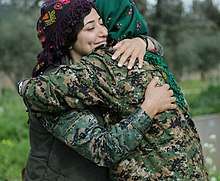Lag Jaa Gale
"Lag Jaa Gale" (Hindi: लग जा गले; lit. Embrace me) is a Hindi song with music by Madan Mohan Kohli and lyrics by Raja Mehdi Ali Khan, written for the 1964 Bollywood film Woh Kaun Thi?. On the screen the song was performed by popular Bollywood star Sadhana, though actually sung by playback singer Lata Mangeshkar.[1]
| "Lag jaa gale" | |
|---|---|
| Song by Lata Mangeshkar | |
| from the album Woh Kaun Thi? | |
| Language | Hindi |
| Released | 1964 |
| Composer(s) | Madan Mohan |
| Lyricist(s) | Raja Mehdi Ali Khan |
"Lag Jaa Gale" since 1964
Lata Mangeshkar's career spanned more than 70 years (starting in 1942) recording thousands of songs. This iconic song [2] is regarded to be one of songs by which Lata Mangeshkar is remembered. Lata herself considered this song to be among her top six favourite songs in 2016 [3] and among her favourite 20 in 2012.[4]
In 2014, on the fiftieth anniversary of the song, she tweeted: ""Namaskar Is varsh 'Lag ja gale ke phir ye hasee'n raat' is geet ko 50 saal pure ho rahe hain. aisa madhur geet aaj bhi purana nahi lagta" (This year the song 'Lag ja gale ke phir ye hasee'n raat' is 50 years old, but it is so sweet, it does not feel old at all)[5] The singer Amit Mishra claims that "My favourite song by Lata ji is Lag Ja Gale and I can hear it a million times on repeat mode"[6]
Lyrics

In the song, the singer expresses that this evening may the last time she will see her beloved. Below, the song is transcribed in Devanagari (Hindi), Nastaʿlīq (Urdu) and English
|
|
|
|
The Hindi expression "ho na ho" implies that it may or may not happen in future. "Gale lagna" refers to embracing such that the necks touch, it can apply to two persons of the same sex as well.
The song expresses profound sadness on the impending partition, which is perhaps final. The Hindi expression "ho na ho" implies that it may or may not happen in future. In Hinduism, death is the parting for this life. The parting, although expresses separation of two lovers in the movie, can also mean death in the Indian context. Some individuals remember having sung this song for the dying grandmother. Others member a close relative, with impending death due to cancer, dancing her last dance with this song. It is sometimes sung at Indian funerals.
It is also considered to be an iconic song composed by Madan Mohan.[7]
In popular culture
It is said that for the movie Woh Kaun Thi, the song was originally rejected by the movie director. He decided to include it when he heard it the second time.[8]
When the former star Sadhana passed way in 2015, she was often recalled by referring to her as the actress of this song.[9]
Renditions
In 1966, two movies used the song: in the Tamil movie Yaar Nee?, it is rendered as "Ponmeni Thazhuvamal", and in the Telugu movie Aame Evaru? it is rendered as "Andala ee reyi".
The singer Shreya Ghoshal performed the song in concert several times in the 2010s. [10]
Its rendition by the Sanam Band has been so popular that some teenagers think they originally sang it.[11] It has also been sung by several singers in Pakistan.
A rendition of the song sung by Jonita Gandhi featured in 2018 film Saheb, Biwi Aur Gangster 3.
References
- Lag Jaa Gale - Sadhana, Lata Mangeshkar, Woh Kaun Thi Romantic Song, 95,502,903 views, Ultra Bollywood, Jan 23, 2010
- Love the iconic song Lag Ja Gale from Woh Kaun Thi? Here's an interesting story, SUBHASH K JHA, DECCAN CHRONICLE, Mar 20, 2018
- Lata Mangeshkar birthday: The legendary singer lists her six favourite songs, Hindustan times, Sep 28, 2016
- Lata Mangeshkar first time chooses her favourite songs Subhash K Jha, Entertainment Times, Sep 28, 2012
- Lag ja gale’ still sounds fresh: Lata, Jagran, 30 Jun 2014,
- World Music Day: Celebrating Musical Maestros Of Bollywood, Mid-Day Jun 21, 2018
- लग जा गले कि फिर मुलाकात हो, न हो...' यतींद्र मिश्र, BBC Hindi, 7 मई 2017
- jansatta, Feb 21, 2018
- लग जा गले कि फिर ये हसीं रात हो ना हो, 25 दिसंबर 2015
- Shreya Ghoshal Week: Best live performances in UK, Feb 5, 2018
- It's funny when some teenagers think 'Lag Ja Gale' is not sung by Lata Mangeshkar but Sanam band: Isheta Sarckar, 14 Jun 2018